Are you a new coach wanting to start your business in the right way?
Then, a coaching contract is what you need.
As a business owner, you want to protect your business and make sure you get the money you’re owed, you don’t suddenly get sued by a disgruntled client, and your business is safe. (Spoiler alert: A coaching contract does that and much more.)
Today, I, together with legal coach Lisa Fraley, share how you can create a solid coaching agreement for your business.
Steps:
Why do you need a coaching contract?
What should your coaching contract include?
How do you use your coaching contract?
How do you enforce your coaching contract?
What about all those other legal considerations?
Further reading: Create a coaching business
Who am I?

My name is Luisa Zhou. I’ve taught thousands of students and counting how to leave their day jobs and start their own business making anywhere from 10K to 100K plus in less than a year. I started my first online business teaching people the digital advertising skills I’d learned from previous jobs, made 6-figures in 4 months, and quit my job. Today, I teach smart, successful people like YOU how to start your own six-figure plus business.
Who is Lisa Fraley?

Lisa Fraley, JD is an Attorney, Legal Coach®, Speaker,#1 Best-Selling Author of Easy Legal Steps and the host of the “Legally Enlightened” podcast on iTunes. As a Holistic Lawyer®, Lisa blends her legal expertise as a former health care attorney in a large corporate law firm and the care of a Health & Life Coach through IIN & Coach U to help thousands of heart-centered holistic health coaches, licensed practitioners, and online business owners protect their businesses and brands with contracts, disclaimers, trademarks and more.

Want to Build a 6-Figure Coaching Business So You Can Achieve More Freedom?
Get Instant Access To My FREE Ultimate Guide Below!
When you sign up, you’ll also receive regular updates on building a successful online business.
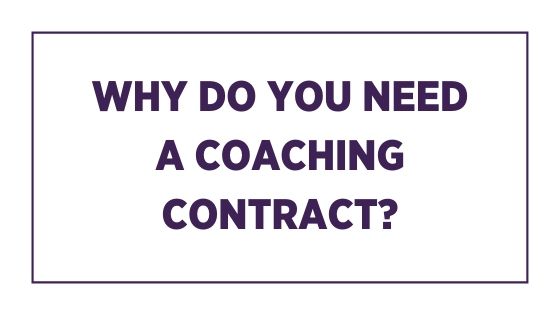
Why do you need a coaching contract?
Wonder what a coaching contract does?
First, research shows that contracts build trust. Your legal agreements will make clients trust you more and that way, improve your coaching services.
Second, if you already have a couple of coaching clients, you know that it happens from time to time:
- Clients who don’t appreciate you, ghost you for no apparent reason, and then blame you for not getting results.
- Students who keep rescheduling with just a few hours’ notice.
- People who send refund requests long after your refund period has expired.
Even if these situations are relatively rare, you still want to protect yourself from them. That’s what a coaching contract does.
A client agreement helps you set boundaries
A one-on-one coaching contract is the first agreement or legal document you should have in place as a coach.
You see: If you’re serious about your business, you should be legally protected from the very beginning. You save time, energy, and a lot of gray hairs by having clear boundaries for your business.
You set the terms of your coaching
Establishing a coaching agreement helps you set the terms for your coaching. It helps you say, “This is how I conduct my coaching calls, how I respond to messages, and how you can get in touch with me.”
And look, it’s not all about telling clients what they can’t do.
An agreement makes it clear what your coaching program is all about. It protects both you AND your client.
As Lisa puts it:
“A Client Agreement is the written contract you use with one-on-one clients. It’s your key document for protecting your one-on-one service or program that you have poured HOURS over to develop (not to mention the blood, sweat, tears and dollars!) and it protects the income that you plan to earn.
Your written Client Agreement gives you strong legal backing, which helps you feel safe, secure, and confident—and it clearly spells out your client policies in one place so your clients don’t have to dig through their e-mails to remember your policies about refunds, missed appointments, or cancellations so you can prevent headaches and awkward conversations later.”
When I started my coaching business, this was the only agreement I had in place. It was only when I added on group programs and courses that I created more contracts.
A coaching contract shows your clients what they can and can’t do with our content and program. It:
- Protects your income.
- Outlines your responsibilities.
- Outlines your client’s responsibilities.
- Sets the payment terms.
- Sets the terms for your coaching calls.
…And much more. For example, here’s how I’ve been able to protect my business with my contracts:
Example: How coaching contracts protect against refunds and chargebacks
It’s relatively rare that I get a refund or chargeback request because I offer quality services and products and I’m careful to make it clear who my products are for.
Still, it does happen.
Most coaching businesses will get at least a few refund requests for every hundred clients or so. (It’s just the name of the business game — ANY business will get refund requests.)
My refund request process depends a bit on the specific request.
If it seems that someone just doesn’t feel like paying (and is in clear violation with my terms), I will hold them to the contract.
That’s where contracts help. If you’re delivering what you promise, you can feel assured that you are protected legally from wrongful refund requests.
I talk more about it in this video:
Plus, coaching contracts help with chargebacks. You can use your contract to show the credit card company what your terms are and that the client isn’t honoring that agreement.
That’s how a contract helps you win the majority of chargeback requests.
After all, if you have delivered your part of the agreement and you offer a great service, you SHOULD get paid for it.
A client who has read and agreed to your terms is responsible for acting in accordance with those terms.
In this video, I talk about another contractual issue… Clients who ghost you!
The most common misconceptions about coaching contracts
There are a few things people tend to get wrong about coaching contracts and their terms. These are…
#1: Content that you and your clients own
Your contract will probably state that you own your own content and your students own the content that they share during the coaching program. But there’s an exception to the rule.
Your contract might mention that if a client shares a testimonial in a facebook group or via email you can use it without having to ask.
My personal policy is to ask if the testimonial was shared via email (as it’s more private).
And if the testimonial is shared in a Facebook group, a semi-public forum, I’ll mark out the name and picture and share it without having to ask.
#2: Non-defamation clauses
Most coaching contracts have a non-defamation clause that states that a client can’t post false information about the coach.
Now, this doesn’t mean that the client can’t post an honest, bad review.
Instead, defamation is a false statement that discredits someone’s reputation.
For example, if a client badmouths a coach because they don’t feel like paying or the coach holds them to the contract they signed, that would likely be defamation. A review, on the other hand, is a review of the coaching services and their results.
This is also not a clause that is unique to coaching agreements. In the same way, most employment agreements have a similar clause. (Which means that you probably can’t badmouth your employer — but nothing keeps you from reviewing them on Glassdoor.)
#3: Responsibility for other clients
Let’s say that you run a group coaching program or a course where your students interact in a private Facebook group or a Slack thread. Are you responsible for how your clients behave?
A possible scenario is that one student might steal an idea or content from another student.
Most coaching contracts will say that the coach can’t be responsible for this. That’s because there’s only so much a coach can do to monitor these situations.
That being said, usually, this is a non-issue to begin with.
Over five years and with thousands of students who have gone through my programs, we’ve only had one instance where this was even close to being an issue.
That time, a student reached out and we had a conversation with the person who was stealing the other student’s content.
It ended up being resolved (to the first student’s satisfaction) with that person taking down all their content and issuing a sincere apology.
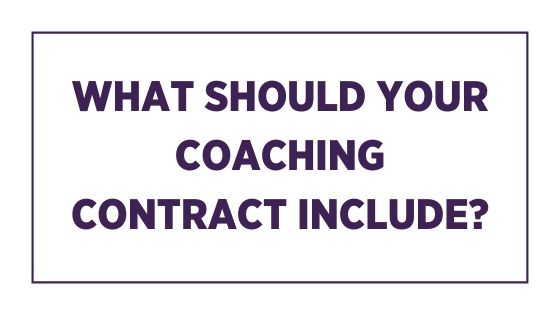
What should your coaching contract include?
Let me share a quick story about why you need terms that are specifically created for a coaching business…
Before I had made any money in my business, I hired a lawyer to write my contract and website terms. I yelped lawyers in my area and specifically looked for lawyers who worked with startup businesses.
Why? I figured they would understand my needs as an online business owner.
In the end, I ended up paying them around $3,000 without much to show for it.
Well after I paid for the contract, I learned more about the legal requirements for my industry. And I realized that my contract wouldn’t cut it. It was about two paragraphs long and a lot of basic things were missing.
For example, my website terms didn’t include a cookie policy, something that is standard for website terms and conditions.
The result? I had to hire a completely new lawyer and spent thousands more.
Lesson learned:
Your contract needs to work for your business. If you’re an online coach, then it needs to take those online requirements into consideration. (On the other hand, if you’re an offline coach, there are other things that need to be addressed, like liability for accidents at your office.)
The length of your coaching contract
As Lisa explains, one of the biggest mistakes coaches make is to create a short contract.
“Each coach is free to be as strict or as lenient as the coach wishes. However, some of the biggest mistakes come from using a very short contract – like 1-2 pages.
Many coaches are afraid to send a 4-5 page contract because they think it’s “long” and might scare away their prospective client.
However, short contracts are generally vaguely worded or incomplete in that they are missing key sections which can work against you.
The way that law works is that if something is not spelled out in writing, it’s harder to prove or defend. It can more easily be construed against you. You actually need to spell your policies out in detail to be super-clear.
For example, if you have a 30-day money back guarantee, instead of writing ‘I offer a 30-day refund’, it’s far more clear and protective to write ‘You have 30 days from the date of purchase to request a refund by sending an email to me at this email address.’”
The thing is…
You need to make sure that your coaching contract is as long as it needs to be. (A great way is to use Lisa’s own legal term templates, which we’ll get to shortly.)
Next, we’ll look at exactly what you need to include in your contract.
The elements of a coaching contract
The good thing about coaching contracts is that you only need to create them once. You then send out this standard contract that you and your client sign.
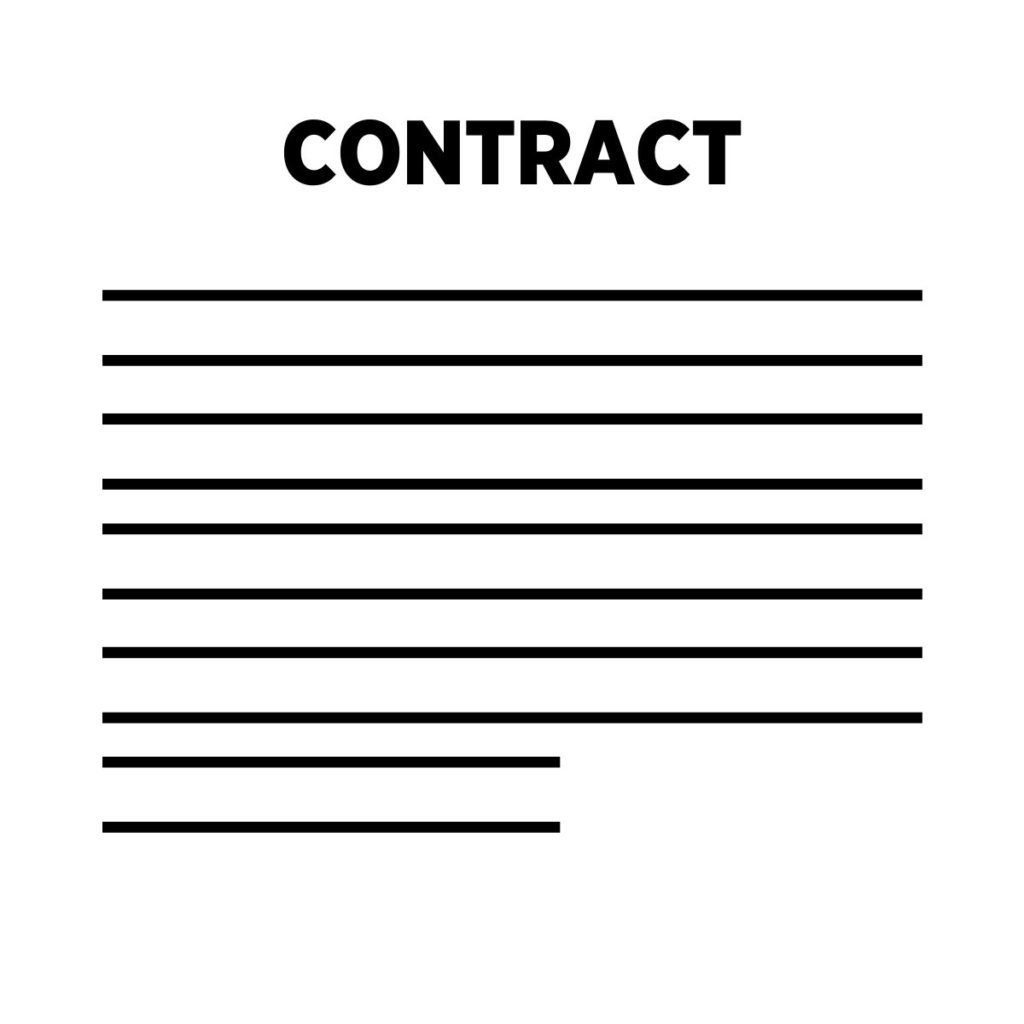
A coaching contract consists of the following parts:
Introduction
The introduction establishes the purpose of your contract. You identify the parties of the contract (that’s you and your client).
Program description
The program description gives a clear overview of your coaching program. What’s included? How many hours/calls?
Expectations and responsibilities
In this section, you list your own responsibilities as a coach. You also list your client’s responsibilities as a coachee.
Scheduling and communications
What is your policy on contacting you and rescheduling calls? This is the section that establishes your policy.
Investment and payment
Here you state your program rates, your refund policy, and other payment-related issues.
Confidentiality
Your confidentiality clause outlines the information that is and isn’t confidential and under what circumstances.
Intellectual property rights
This is the section where you establish how your clients can use your content.
Personal responsibility, disclaimer, and release of claims
Here, you tell clients what they can expect of your services and what they shouldn’t expect. You’re basically saying that you can’t promise specific results and that your advice isn’t medical/financial or legal.
Other terms
This section helps you include different terms that don’t fit in the other sections. For example: How contracts can be terminated and how you resolve disputes.
A coaching contract template
Now, if you want a secure contract that you KNOW will cover most situations you might face as an online coach, I recommend that you buy contract templates for coaching. Lisa offers DIY templates, which are created for online coaches and cover everything you need in your business.
Her legal starter kit for 1-on-1 clients include all the legal contracts you need right now:
- A one-on-one coaching agreement.
- A disclaimer.
- And a website disclaimer, privacy policy, and terms and conditions.

And, if you’re just setting up your business, take a look at Lisa’s Sole Proprietor Biz Registration and Taxes package.
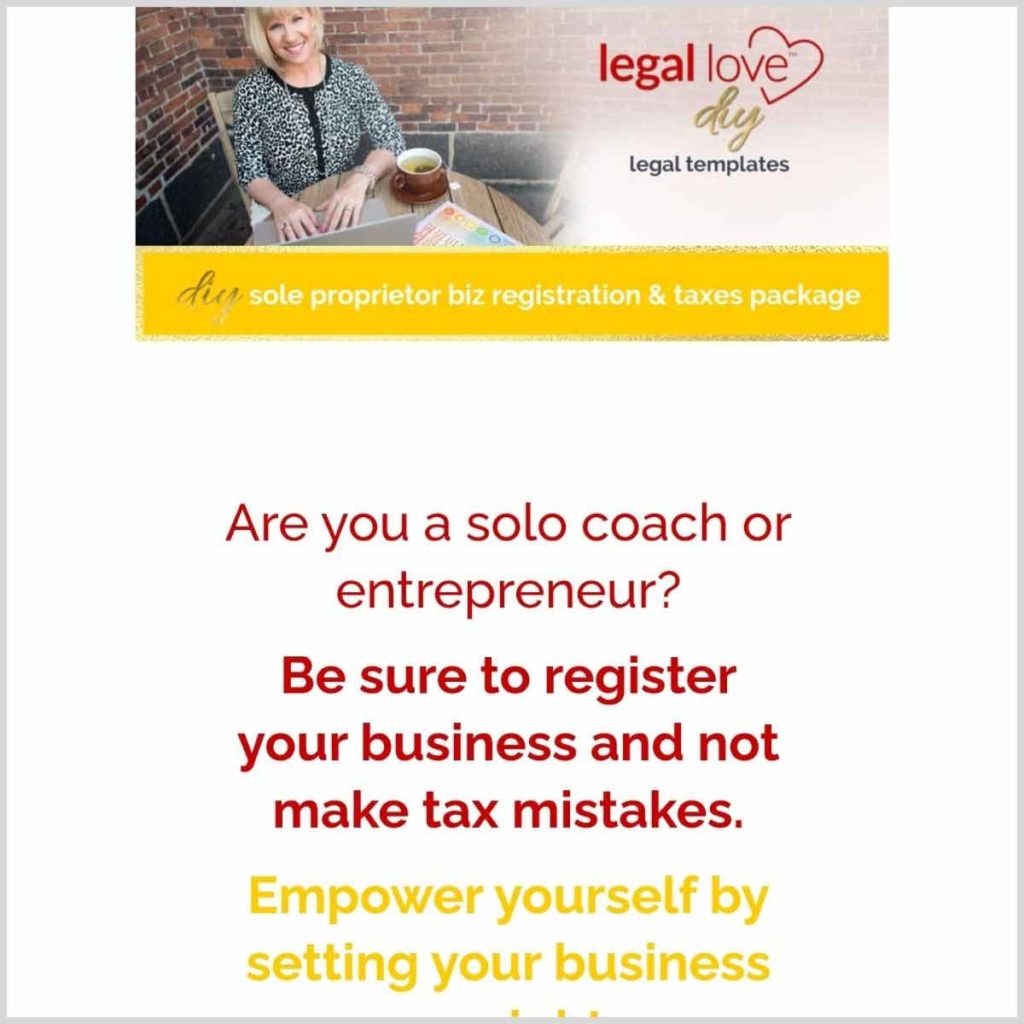
You can also use a tool like LegalZoom or RocketLawyer. My own preference is Lisa’s templates because as a lawyer for coaches, Lisa has so much experience in the coaching industry.

Want to Build a 6-Figure Coaching Business So You Can Achieve More Freedom?
Get Instant Access To My FREE Ultimate Guide Below!
When you sign up, you’ll also receive regular updates on building a successful online business.
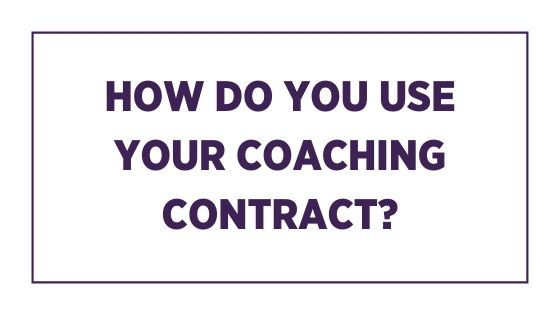
How do you use your coaching contract?
Now, you know how to set up your contract.
But how do you actually use it?
I have a standard process in place.
It’s simple and pretty much automated:
When a client says yes to working with you, they will first pay you.
After you’ve received the payment, you send a contract. I use HelloSign, which sends the contract straight to your client. It’ll also send reminders, if needed, to your client to review and sign the contract.

There’s one important thing to note here:
You need to ask them to sign the contract as close as possible to paying you.
Why?
If they don’t agree to your terms, you’ll need to refund them.
And so you should never have your first call before your client has signed the contract. (Or you risk doing work for free.)
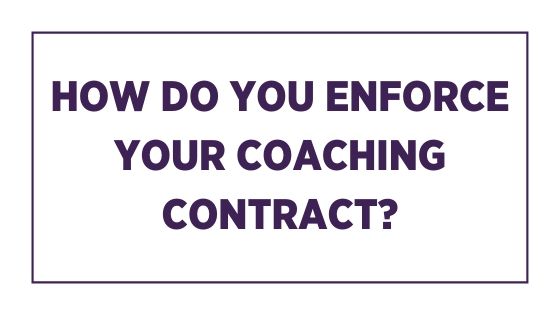
How do you enforce your coaching contract?
In most client relationships, both you and the client will walk away happy with your time together.
But sometimes, you will need to enforce your contract. The specific rate of enforcement cases depends (and can vary a bit from industry to industry), but as Lisa puts it:
“Sometimes newer coaches can feel more leery of stating and enforcing clear boundaries around payments, refunds, cancellations because they’re worried that they’ll lose clients, so they may end up with clients missing payments or rescheduling calls up to 30-35% of the time.
However, as coaches progress in their practices, usually they feel more comfortable holding their boundaries more (with love, of course!) and may only have to chase down payments or reschedule calls only 10-15% of the time, or even less often.”
Enforcing your contract
So, what if you HAVE to enforce your contract?
When should you enforce it? And how?
Lisa explains:
“Coaches have the right to enforce their Agreement anytime a client oversteps a boundary or who doesn’t hold up their end of the Client Agreement – in other words, as we say in legal-speak, when the client “violates a term of the Agreement.”
Enforcement can take many forms. It could be calling the client and discussing the situation or sending an email all the way through actually bringing a lawsuit if a significant amount of money is in question and hasn’t been paid.
The best option is to send your initial correspondence by email (rather than merely talking by phone) so that you have proof that you have reached out to the client in writing to try to resolve the situation and proof of the date on which the email was sent.”
Step-by-step enforcement process
The step-by-step of enforcing your contract is this:
Step 1: Try to enforce your contract amicably. Send a few emails and try to get your client on the phone.
Step 2: If this doesn’t work, send your client a cease and desist letter. For this, you need a lawyer’s help.
Step 3: The biggest step is to enforce your conflict resolution clause, either in court or in a private proceeding. This is a whole process and comes with a lot of costs so you should only sue in a very small number of cases, if at all.
Besides these steps, you’ll also have standard processes in place for chargebacks and non-payments. I have a system set up with a company that handles this for me. But when you’re just starting your business, you’re better off handling this yourself.
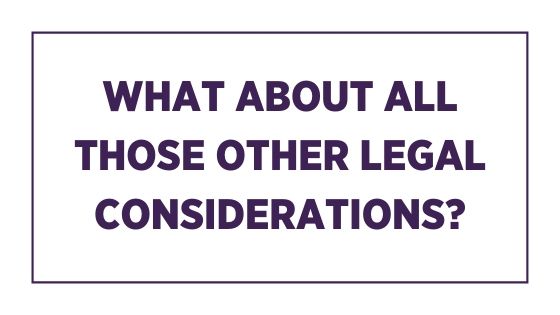
What about all those other legal considerations?
Now you know A LOT about coaching contracts (and you can even get Lisa’s bulletproof contract template to set up one for yourself!)
But there are a few other things you might be wondering about for making your business comply with the law.
I’ve listed some of the most common questions I get here:
#1: Do you need insurance?
A contract is actually the first step BEFORE you get insurance. That’s because a contract sets the boundaries for your services.
The next step is to get insurance.
In most cases, you’re not required to get insurance. But in some industries (mainly health-related industries), you might be obliged to get insurance.
You can read more about business insurance on the SBA’s site.
#2: GDPR, Canada’s Anti-Spam Legislation, and CAN-SPAM
You might have heard of GDPR, CASL, and CAN-SPAM, the EU’s, Canada’s, and the US’s privacy and/or anti-spam legislations. How do you go about meeting these requirements?
It actually all comes down to treating your community members with respect.
Have a clear sign on your email opt-in form that says that people are going to be added to your email list, a double email opt-in button that people receive when they sign up, and don’t send newsletters to people who haven’t signed up for your email list.
(Want to learn more? Lisa has A LOT of great content on this. For example, this article on GDPR.)
#3: International clients and legal considerations
How do you work with international clients from a legal standpoint?
“If you have international clients, you want to make sure you have registered your business locally to prove your business is based in your state.
Then you want to be sure that your Governing Law section in your Client Agreement states that the law which will govern your one-on-one relationship is the law of your state.
Of course, there may be other international or national, state or local laws you need to follow as well,” says Lisa.
Want more? Check out Lisa’s podcast episode on this.

Want to Build a 6-Figure Coaching Business So You Can Achieve More Freedom?
Get Instant Access To My FREE Ultimate Guide Below!
When you sign up, you’ll also receive regular updates on building a successful online business.
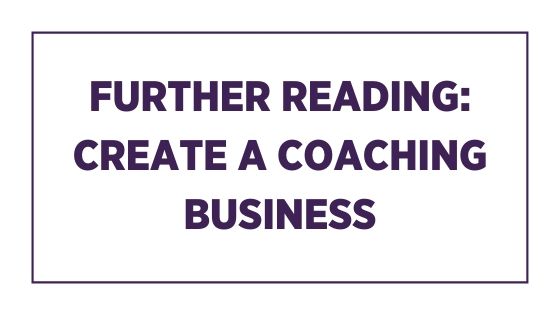
Further reading: Create a coaching business
If you want more advice on how to start your coaching business, don’t miss these articles:
Want to know the step-by-step process of starting a 6-figure coaching business? Here you go.
Want to find YOUR perfect coaching niche? This post shows you how.
Wondering what it takes to create a coaching package that sells like hotcakes? I spill the beans here.
How do you successfully price your coaching services? In this article, I share my best tips.
I have a system for getting coaching clients fast. Want to learn what it is? Read on!
Wonder how YOU can be a great coach and hold powerful coaching sessions? Read this post.
Ready to create your own coaching contract?
There you have it! Now you know why you need a coaching contract — and how to create one.
Next:
Set up your own legal agreement. The easiest is to create one yourself with a tool like LegalZoom or buy one of Lisa’s ready-made agreements.
Let me know in the comments below:
What’s holding you back from creating a coaching contract?
(Disclaimer: This article is not meant as legal advice. Consult a legal expert for tailored legal information that applies to your specific situation.)









2 Responses
Thanks for this. It is important to have a copy of contracts especially if you have a deal with your clients. You can pull this out as a template.
You’re welcome!